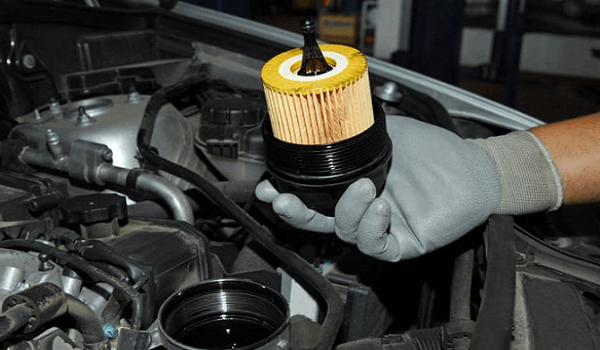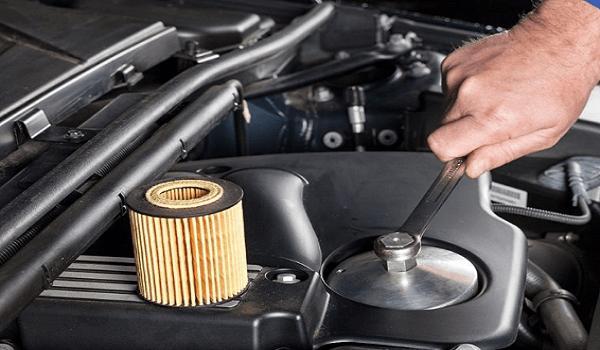How to Tell If Oil Filter Has Been Changed – Regular oil and oil filter changes are crucial for maintaining the longevity and health of your car’s engine.
The oil filter plays a crucial role in keeping the oil clean and free from contaminants, which helps the engine to perform optimally.
But how do you know if the oil filter has been changed during the last oil change? In this article, we will discuss some telltale signs that indicate if the oil filter has been changed or not.
What is An Oil Filter and What Does it Do?

Before discussing the signs that indicate if the oil filter has been changed or not, let’s first discuss what an oil filter is and what it does.
The oil filter is a small device located in the engine compartment that filters the engine oil to remove contaminants and particles that can cause damage to the engine.
It works by trapping contaminants, such as dirt, metal particles, and other debris, as the oil circulates through the engine.
An oil filter that is functioning properly is essential for the health of your car’s engine.
If the oil filter becomes clogged or dirty, it can no longer effectively filter the oil, which can lead to a variety of problems, including decreased engine performance and premature engine wear.
Signs that the Oil Filter Has Been Changed
Clean Oil
The easiest and most straightforward way to determine if the oil filter has been changed is to check the oil.
When the oil is changed, it should be clean and free from debris. If the oil appears dirty or has visible particles in it, it could be an indication that the oil filter has not been changed.
Sticker or Marking
Many professional mechanics and oil change shops place a sticker or mark on the windshield or engine compartment to indicate when the oil and oil filter was last changed.
If you have taken your car to a professional for an oil change, check for this sticker or mark. If it is present and shows that the oil filter was changed, you can be confident that the filter was changed.
Tight Filter
Another way to tell if the oil filter has been changed is to check its tightness. If the oil filter is loose, it could indicate that it was not installed correctly during the last oil change.
On the other hand, if the filter is tight, it could be an indication that it was recently changed.
Filter Color
The color of the oil filter can also indicate if it has been changed or not. A new filter will generally have a white or off-white color, while an old, used filter will be darker in color and may have oil and debris stuck to it.
No Leakages
If the oil filter has been changed, there should be no oil leakage around the filter area. A loose or improperly installed filter can cause oil to leak out, which can damage the engine and lead to a loss of oil pressure.
If you notice any oil leakage around the filter area, it could be a sign that the filter was not changed or installed correctly.
Engine Performance
If you have been driving your car for a while, you will likely be familiar with how it normally sounds and performs.
If you notice a change in engine performance, such as increased noise or reduced power, it could be an indication that the oil filter is clogged or dirty and needs to be changed.
A new filter will help to keep the engine running smoothly and quietly.
Oil Pressure

Low oil pressure can be a sign that the oil filter has not been changed or is clogged. The oil pressure gauge on your dashboard should show a consistent reading while the car is running.
If you notice that the oil pressure gauge is fluctuating or showing a low reading, it could be a sign that the oil filter needs to be changed.
FAQs:
What happens if you change the oil but not the oil filter?
Changing the oil without changing the oil filter can lead to several problems. The oil filter plays a crucial role in keeping the engine oil clean and free from contaminants, such as dirt and metal particles.
If the oil filter is not changed, it will become clogged with these contaminants, reducing its ability to effectively filter the oil.
This can lead to decreased engine performance, increased engine wear, and eventually engine damage.
How long does an oil filter last?
The lifespan of an oil filter can vary depending on several factors, such as the type of filter, the quality of the oil, and the conditions in which the car is driven.
Generally, oil filters can last between 5,000 and 10,000 miles, or 6 months to 1 year, before they need to be replaced.
However, it is recommended to change the oil filter during each oil change to ensure optimal engine performance.
What happens if dirty oil isn’t filtered?
If dirty oil is not filtered, it can lead to several problems with the engine. The oil serves as a lubricant for the engine parts, reducing friction and heat, and carrying away debris and contaminants.
If the oil is not filtered, it can become contaminated with dirt, metal particles, and other debris, which can cause damage to the engine parts, increase engine wear, and reduce engine performance.
Eventually, if the dirty oil is not changed or filtered, it can lead to engine damage and failure.
Therefore, it is important to regularly change the oil and oil filter to ensure that the engine stays healthy and performs optimally.
Summary: How to Tell If Oil Filter Has Been Changed
Regular oil changes and oil filter changes are essential for maintaining the health and longevity of your car’s engine.
It is important to make sure that the oil filter is changed along with the oil during each oil change to ensure that it continues to function properly.
If you are unsure if the oil filter has been changed during the last oil change, there are several signs that you can look for.
These signs include checking the oil for cleanliness, looking for a sticker or marking that indicates the last oil change, checking the tightness of the filter, examining the color of the filter, looking for any oil leakages around the filter area, monitoring engine performance, and checking the oil pressure gauge.
By regularly checking and changing the oil filter, you can help to ensure that your car’s engine stays healthy and performs optimally.
If you are unsure about changing the oil filter yourself, it is recommended to take your car to a professional mechanic or oil change shop to have it done.
In conclusion, maintaining your car’s engine health is essential to keep your car running smoothly and safely. By paying attention to the signs that indicate if the oil filter has been changed or not, you can help to prevent engine problems and extend the life of your car.
So, always make sure to change the oil and oil filter regularly, and take your car for regular maintenance to keep it in top condition.
